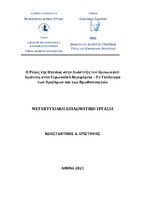| dc.contributor.advisor | Αμίτσης, Γαβριήλ | |
| dc.contributor.author | Χριστοφής, Κωνσταντίνος | |
| dc.date.accessioned | 2021-05-26T10:39:09Z | |
| dc.date.available | 2021-05-26T10:39:09Z | |
| dc.date.issued | 2021-05-25 | |
| dc.identifier.uri | https://polynoe.lib.uniwa.gr/xmlui/handle/11400/653 | |
| dc.identifier.uri | http://dx.doi.org/10.26265/polynoe-504 | |
| dc.description.abstract | Η παρούσα διπλωματική εργασία εξετάζει τον ρόλο που διαδραματίζουν οι Πρωθυπουργοί και οι Προέδροι της Δημοκρατίας της Ευρωπαϊκής Περιφέρειας στην ανάπτυξη του κοινωνικού κράτους. Παράλληλα, παρουσιάζεται η διαμόρφωση των κοινωνικών πολιτικών που έχουν ακολουθηθεί στους τομείς της οικογένειας, του συνταξιοδοτικού συστήματος και τις μεταρρυθμίσεις αυτού καθώς και την κοινωνική ένταξη σε αυτές τις χώρες. Αυτό πραγματοποιείται μέσα από τις επισκέψεις στους επίσημους διαδικτυακούς τόπους των Γραφείων των Πρωθυπουργών και των Προέδρων, την περιήγηση στις ιστοσελίδες των πολιτικών σχηματισμών των εκλεγμένων από τον λαό Ηγετών και την μελέτη εκθέσεων από ανεξάρτητους Φορείς, ιδιώτες μελετητές και φυσικά, την ίδια την Ευρωπαϊκή Ένωση. Οι ιστοσελίδες των Ηγετών που μελετώνται είναι μόνο αυτές που διαθέτουν πρόσβαση στην αγγλική γλώσσα. Ως Ευρωπαϊκή Περιφέρεια εννοείται ο χώρος της Ενωμένης Ευρώπης των 27 και το Ηνωμένο Βασίλειο αλλά και οι χώρες της Τουρκίας και της Ρωσίας, λόγω έντονου ακαδημαϊκού ενδιαφέροντος. Αν και ο ρόλος της Ηγεσίας δεν μπορεί να εξαχθεί μετά βεβαιότητας λόγω ότι οι ιστοσελίδες των Γραφείων δεν είναι πλήρως ενημερωμένες και η βιβλιογραφία εστιάζει περισσότερο στις δράσεις της Κεντρικής Κυβέρνησης, παρατηρείται ένα κοινό μοτίβο στις πολιτικές που ακολουθούνται στις υπό εξέταση χώρες. Ταυτόχρονα, υπάρχουν θετικά παραδείγματα πολιτικών που ο Έλληνας Πρόεδρος της Δημοκρατίας και ο Πρωθυπουργός μπορούν να αξιοποιήσουν και να μεταφέρουν στην εγχώρια πραγματικότητα. | el |
| dc.format.extent | 181 | el |
| dc.publisher | Πανεπιστήμιο Δυτικής Αττικής | el |
| dc.rights | Αναφορά Δημιουργού - Μη Εμπορική Χρήση - Παρόμοια Διανομή 4.0 Διεθνές | * |
| dc.rights | Attribution-NonCommercial-NoDerivatives 4.0 Διεθνές | * |
| dc.rights.uri | http://creativecommons.org/licenses/by-nc-nd/4.0/ | * |
| dc.subject | Πρόεδρος της Δημοκρατίας | el |
| dc.subject | Πρωθυπουργός | el |
| dc.subject | Κοινωνικό κράτος | el |
| dc.subject | Οικογενειακή πολιτική | el |
| dc.subject | Συνταξιοδοτικά συστήματα | el |
| dc.subject | Κοινωνική ένταξη | el |
| dc.subject | Social state | el |
| dc.subject | Family policy | el |
| dc.title | Ο ρόλος της ηγεσίας στην ανάπτυξη του κοινωνικού κράτους στην Ευρωπαϊκή Περιφέρεια – Το υπόδειγμα των προέδρων και των πρωθυπουργών | el |
| dc.title.alternative | The role of the leadership in the development of the social state in the European Region – The model of presidents of the republic and the prime ministers | el |
| dc.type | Μεταπτυχιακή διπλωματική εργασία | el |
| dc.contributor.committee | Σούλης, Σωτήριος | |
| dc.contributor.committee | Πιερράκος, Γεώργιος | |
| dc.contributor.faculty | Σχολή Διοικητικών, Οικονομικών & Κοινωνικών Επιστημών | el |
| dc.contributor.department | Τμήμα Διοίκησης Επιχειρήσεων | el |
| dc.contributor.master | Διοίκηση και Διαχείριση Υπηρεσιών Υγείας και Κοινωνικής Φροντίδας | el |
| dc.description.abstracttranslated | The dissertation thesis focuses on the role of the Prime Ministers and the Presidents of the Republic in the development of the social state in the countries of the European Region. In addition, it includes the social policies that have been implemented in the fields of family policy, the pension system and its reform and the social inclusion in the aforementioned countries. The research was conducted via visiting the websites of the Offices of the Prime Minister and of the Presidents of the Republic, accessing the web pages of the leaders appointed by popular vote, and studying reports from individual researchers, private Organizations, and of course, the European Union itself. The websites excluded from the analysis are the ones that do not have access to the English language. The European Region consists not only of the 27 member states of the European Union but also the United Kingdom, the Republic of Turkey, and the Russian Federation due to their significant research value. Even though the roles of the Leaders cannot be evaluated fully since the websites are not detailed enough and the literature concentrates upon the actions of the Central/Federal Government, one can see a similar pattern that is unfolded in the under-review countries. At the same time, there are some positive examples that the Greek Prime Minister and the President of the Republic can learn from and should try to emulate. | el |


